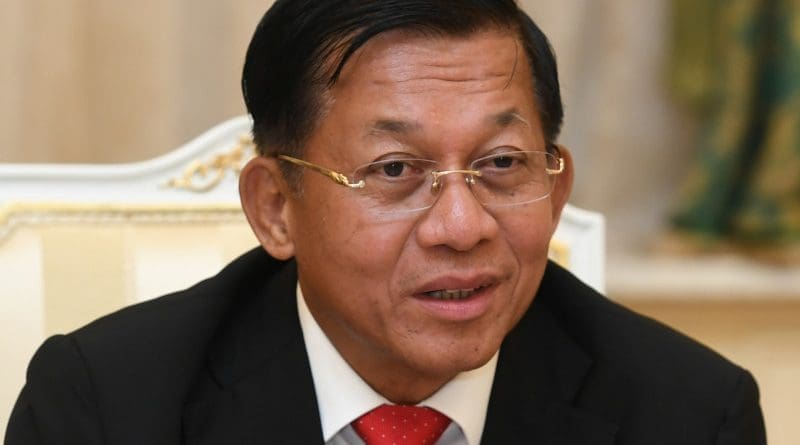From Junta Chief To Prime Minister: Hlaing’s Transformation Triggered By ‘Disrespectful Episode’ In Russia – OpEd
Myanmar’s junta chief Min Aung Hlaing visited Russia on June 21 as his second overseas visit following the ASEAN summit since seizing power through a military coup on February 1. In addition to attending the Moscow Conference on International Security (June 22-24), he met with the head of the Russian Security Council Nikolai Patrushev, the Minister of Defense Sergei Shuigo, and the head of the arms exporter Alexander Mikheev. During the visit, he was not greeted with Russia’s traditional “salty bread” and could not meet with Russian President Vladimir Putin. Moreover, the Russian news agency `TASS’ addressed Hlaing not as the head of state but as the head of the military. Such a disrespectful visit to Russia, a friendly country, is thought to have inspired Min Aung Hlaing to assume the position of the head of government.
On August 1, Myanmar’s junta chief Min Aung Hlaing transformed the powerful “State Administration Council” into a “Caretaker Government” and called himself “Prime Minister”. A few days after the seizure of power on February 1, the military junta declared a one-year state of emergency, extending it to two and a half years now. However, there is no provision in the constitution written by the military to form a caretaker government. It is actually a historic repetition of the many misdeeds of the Myanmar army which is reminiscent of the events of 1958 when they abolished everything and formed a new government.
As a road map of power transfer through time-lapse, Myanmar’s military transformed the Military Council into a civilian administration. They are likely to stay in power for a while and want the people to adapt to the new rules. Through this, they will gradually try to establish themselves as the legitimate government. Another reason to transform themselves into a civilian government is to gain international recognition.
Aung San Suu Kyi’s party, the NLD, won a landslide victory in the 2020 national election, with about 82% of the popular vote, but the military staged a military coup alleging vote-rigging. Junta later arrested the leaders of the pro-democracy party and declared the election illegal. A mass movement was formed around this incident and to date, about 970 civilians have been killed and 6,000 arrested by the military. The world’s most brutal and heinous military force has concentrated power through killings, threats and torture; despite strong opposition from mass people at all levels in Myanmar against the military rule. Apart from Russia and China, other countries in the world have not directly supported Myanmar’s military government. Therefore, the military of Myanmar will try to gain international recognition by forming a caretaker government with the direct cooperation of the two countries and the indirect support of some neighboring countries.
The visit of Myanmar’s junta chief to Russia came as a surprise after the UN General Assembly passed a resolution on June 18 to `stop the flow of arms’ into Myanmar. Only Belarus voted against the resolution; China, Russia and 34 other countries abstained. Myanmar’s historic military ties with Russia are believed to have been strengthened after the military coup. Russian Deputy Defense Secretary Alexander Fomin’s visit to Myanmar in March is the first high-level visit by a foreign official since the coup. A military delegation led by the Commander-in-Chief of the Myanmar Air Force Maung Maung Kyaw visited Moscow in June. And the same month of the year, Russia’s ambassador to Myanmar Nikolay Listopadov and Myanmar’s military-appointed industry minister Charlie Than discussed bilateral economic ties, including cooperation in pharmaceutical production and rubber and garment production and the resumption of operations at a dormant steel plant in Shan State. These incidents prove how Russia is supporting the military government of Myanmar. Though overall trade between Russia and Myanmar has remained minimal, the two countries have recently deepened their military cooperation and Russia is now the second-largest military exporter to Myanmar after China.
Alexander Mikheev told President Vladimir Putin at Russia’s annual MAKS air show on July 20 that Myanmar is one of the main customers of Rosoboronexport (Russia’s state arms manufacturer) in Southeast Asia and a major partner of Rostec, Russia’s state space and defense agency. According to SIPRI, Myanmar bought military hardware from Russia worth an estimated $1.5 billion between 1999 and 2018, which is 39% of its total arms imports. In recent years, Russia has significantly increased its support for the junta, including arms sales, defense assistance, various types of military training, and scholarships for thousands of soldiers to study at Russian universities. Human rights groups have condemned the Russian president for allowing weapons to be sold to Myanmar’s military junta because imported weapons are being used more to quell popular protests.
Due to the sanctions placed by the United States, the sale of Russian-made weapons to Myanmar created a new field for arms trade for Russia. On the other hand, the power of Myanmar’s military is being usurped with the support from Russia. Like China, Russia also provides Myanmar a diplomatic shield at the UN, as manifested in the Russian vetoes in all UN resolutions against Myanmar on Rohingya genocide and coup issues. Russia and Myanmar will maintain a more cordial relationship and it will be helpful to establish relationships all over the world in the future if the perpetrator of Rohingya genocide Hlaing heads the state and government. Senior General Min Aung Hlaing may have learned that lesson from the momentary humiliation of the Russia trip.
*Tonmoy Chowdhury is an independent researcher. He is interested in Refugee and Migration, Human Security Issues, South Asian Politics and Economic Diplomacy. The views expressed are personal. He can be contacted at [email protected]

